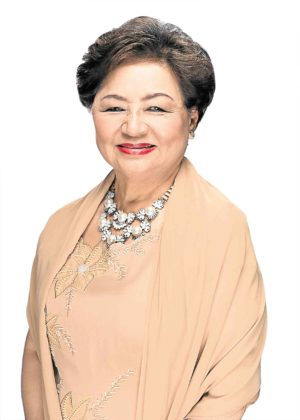Bringing PH dried seaweeds to the world
The W Group of Companies owns W Hydrocolloids Inc., one of the Philippines’ biggest exporters of dried seaweed, which is used to make carrageenan, a major ingredient in dairy, meat and personal care products because of its gelling, thickening, texturing and stabilizing properties.
Rosalind Wee, company cofounder and vice chair, and a Pearl Buck International Woman of the Year awardee in 2009 shares with us her thoughts on exporting dried seaweeds.
Q: What’s your main strategy to gain new clients, customer satisfaction and market shares in the international market?
A: Our main strategy is to understand the needs of our clients and provide them the solution. If our clients succeed, we also succeed with them. We also make sure our products are competitive in terms of price and quality. It is also important to have a good relationship with our clients and they trust us to assist them improve their products.
Q: You have 25 distributors worldwide. What criteria do you use to appoint these distributors and why?
A: We choose distributors based on their experience/track record, knowledge of the market and capacity to promote our products. Our distributors are our representatives and they should have the same values and commitment as we do.
Q: I understand there are many substitutes and other countries are getting aggressive. How’s the competitive landscape so far? What’s your edge?
A: The seaweed industry is getting more competitive and commoditized. Other countries like Indonesia are improving with higher volume of seaweed production and having competitive prices. Our edge and advantage aside from being the pioneer seaweed producing country is our ability to adapt to changes in the market by investing in high value-added products through research and development. I also consider our human capital our biggest advantage as our employees are our greatest assets.
Q: Your Rico Carrageenan is one of the world’s preferred brands. What do you do to assure your clients and regulators of safety?
A: We continue to invest in food safety both in our production facilities and through our contract seaweed farmers. We have third party auditors inspect our factories to ensure that our facilities, equipment and systems comply with global food safety standards. We believe that long term survival in the food industry is based on customer assurance that we provide safe and healthy food ingredients.
Q: The Philippines has an occasional shortage of dried seaweeds, requiring you to buy sometimes from Indonesia, the region’s upcoming leading producer. Why is this so?
A: We believe changes in weather patterns and ecological disruptions are the main causes of the shortage of seaweed in the Philippines. In some seaweed growing areas, the water becomes too crowded and polluted that seaweed growth is hampered.
Q: From seaweeds, you went into property development. Buildings with a big W sign are all over BGC. Is there a product portfolio diversification behind this?
A: Our family started in the seaweed business almost 50 years ago. We have experienced the ups and downs of this industry and realized the risk of putting everything in one basket. Diversifying to property development has given us the opportunity to expand to an industry which is not only more stable but also complimentary. Real estate is based on hard assets whose value will appreciate over time. It is also a hedge on the local currency and economy where our seaweed business is more export-oriented.
Q: You are the 10th of 14 children, your neighbor in Jolo paid your college tuition fee. You shifted business to dried seaweeds when an American professor from Hawaii inquired about Eucheuma Cottonii seaweed. Japan’s Jica was looking to place their retired carrageenan executives in the Philippines. Tell us your reflections about your many good breaks.
A: In this world, nothing is easy. You have to work hard to be successful. When Dr. Doty was looking for a kind of seaweed, eucheuma, we were already exporting marine products, such as dried cucumber, dried abalone, trocas shells, Mother of Pearl shells to Japan, Hong Kong and Korea. Jica’s help was one step ahead of just exporting dried seaweeds. It was the start of our going into processing dried seaweeds into its finished product call carrageenan. It’s in most of the processed food that we are consuming every day without noticing it.
Our joint venture with the French company Sanofi further improved our semirefined carrageenan into refined carrageenan. I even tried to go into blending of carrageenan with different food ingredients and was successful in supplying local ice cream, ham and sausages manufacturers their stabilizers, binders and gelling agents. These opportunities came when our government banned the importation of nonessential food products. No choice for food manufacturers except to try my formulation. Everything’s God’s plan. You just have to accept it by making it work. —CONTRIBUTED















